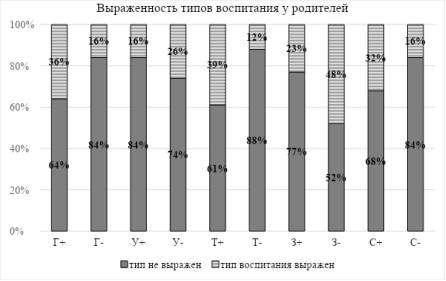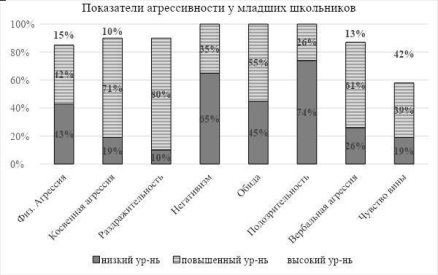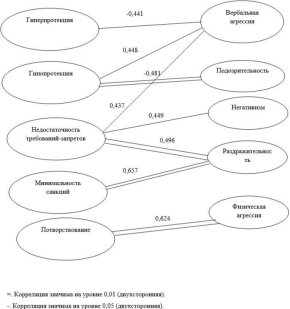This article presents the results of a study of the influence of the connection between the type of family education and the aggressive behavior of children of primary school age. The study revealed that the expression of verbal aggression in children of primary school age is influenced by such parenting styles as hyperactive protection and hypo protection.
Keywords: aggressiveness, family-parenting style, child-parent relationships, aggressiveness, family-parenting style, child-parent relationships.
The type of upbringing plays a key role in the formation of personality in the early stages of its development. Depending on the methods that parents used in raising their child, a large number of psychological factors of aggressive behavior in the future can be viewed and predicted. Sometimes, even the style and type of parenting is used again when children grow up and raise their own children. But not every type of upbringing is capable of successfully influencing the formation and development of personality.
One of the conditions influencing the manifestation of aggressiveness in children, as indicated by researchers S. V. Kovalev, A. I. Zakharov, I. Kogan and others, is the psychological microclimate of the family. It should be noted that what is decisive is not its composition — not complete, complete, disintegrated, but the relationships that develop between adults and children, between adult family members. In the formation and development of an individual, the importance of intrafamily relations is due, on the one hand, to the fact that they are the first specific example of social relations that a person encounters from the moment of birth. On the other hand, they focus and provide a unique miniature expression of the entire wealth of social relations, and therefore, create the possibility of early inclusion of the child in their system [4].
The problem of relationships and microclimate in the family was studied by: A. A. Bodalev, L. I. Bozhovich, V. S. Mukhina, T. A. Repina, P. K. Anokhin, K. V. Vilyunas, A. N. Leontyev, S. L. Rubinstein, P. V. Simonov, E. Izard and others. The following researchers studied the problems of aggressiveness at different stages of child development: I. V. Dubrovina, V. I. Garbuzov, A. V. Zakharova, E. B. Kovaleva and others.
We hypothesized that there is a connection between the type of family upbringing and the aggressive behavior of children of primary school age.
Research methods:
- “ABC” method (children's version for parents 3–10 years old) (E. G. Eideniller, V. V. Yustitskis).
- “Bass-Darki Questionnaire” (A. Bass and A. Darki).
Base and sample of the study: the study was conducted on the basis of MBOU Secondary School No. 5 in the city of Kurchatov, Kursk region. It was attended by 30 junior schoolchildren aged 7–8 years, as well as their parents in the amount of 30 people.
The analysis and interpretation of the results obtained must begin with a description of the data on the study of types of family upbringing (Fig. 1.).

Fig.1. Distribution of parents of primary schoolchildren depending on the type of family upbringing (%)
Thus, hyperprotection is present in 36 % of parents. The results showed that 16 % of respondents had hypoprotection. Indulgence in the upbringing process is characteristic of 16 % of parents, while 26 % of respondents may ignore the needs of the child. 39 % of parents tend to place excessive demands or obligations on their children, while 12 % make only insufficient demands. Also, the presentation of excessive demands and prohibitions in the process of upbringing is typical for 23 % of respondents, but almost half of the parents (48 %) have a high rate of insufficiency of prohibitions in upbringing. Excessive sanctions are applied to children by 32 % of parents; 16 % of parents limit themselves to minimal sanctions in raising a child. Let's move on to indicators of aggressiveness among younger schoolchildren (Fig. 2.).

Fig. 2. Indicators of aggressiveness of younger schoolchildren (%)
According to the results of the study, the following percentage ratio of indicators of aggressiveness of younger schoolchildren was revealed. On the scale of physical aggression, junior schoolchildren in this sample were distributed as follows: High level 15 %, average level 43 %, low level 42 %.
On the scale of indirect aggression, the sample participants were distributed as follows: 10 % of children had a high level, 71 % had an average level, and 19 % had a low level. Most children in the sample tend to show indirect aggression depending on the situation. On the irritability scale, an equal number of low and high levels were noted — 10 %. The average level was 80 % of the total sample. Most children experience angry outbursts over minor issues.
According to the negativism scale, respondents were divided into two groups: low level — 65 % and average level — 35 %. The majority of respondents with a low level of negativism noted that children do not show rejection or indifference to others.
On the scale of touchiness, two groups were also distinguished. Low is 45 % of the total and medium is 55 %. The middle level prevails, although by a small margin. This may mean that these children are less likely to hold grudges.
The levels of suspicion were divided into two groups: Low level — 74 %, medium level — 26 %. This may indicate a low level of skepticism in this sample. These children do not experience prejudice towards others.
The distribution on the verbal aggression scale shows a high level — 26 %, medium — 61 % and low — 13 %. This gives an idea of the average level of verbal aggression. These children do not like to express verbal aggression, but do not refuse to do so if necessary.
The guilt scale has the following distribution among schoolchildren in this sample: High level — 19 %, average — 39 %, low — 42 %. This distribution may indicate a low level of guilt among this sample.
To confirm the hypothesis about the connection between the style of parental education of primary schoolchildren and aggression, the Spearman correlation coefficient was used.
As a result of the statistical analysis, a statistically significant relationship was identified between several indicators of the severity of parental education style and aggression in younger schoolchildren (Fig. 3).

Fig.3. Correlation galaxies between the style of parental education of parents and aggression of younger schoolchildren
The hyperprotection scale (G+) showed a significant inverse relationship with the verbal aggression (VA) scale (r = -0.441, p ≦ 0.05). Hypoprotection (G-) was found to have a connection with verbal aggression (VA) (r = 0.448, p ≦ 0.05) and an inverse relationship with the suspicion scale (S) (r = -0.481, p ≦ 0.01). The data obtained may indicate that those children who are given insufficient attention or left to their own devices are capable of expressing aggression verbally, they are characterized by swearing, screaming and foul language. At the same time, such children are less likely to treat the world with total distrust and hostility.
There is a significant connection between the scales of physical aggression (PA) and indulgence (U+) (r = 0.624, p ≦ 0.01). The scale of insufficiency of demands-prohibitions (Z-) has a connection with the negativism scale (N) (r = 0.499, p ≦ 0.05), irritability (P) (r = 0.496, p ≦ 0.01) and verbal aggression (r = 0.437, p ≦ 0.05). This may indicate that children who are allowed everything by their parents, and who also have insufficient demands, tend to have reduced control of their emotions and irritability. Such children may have outbursts of anger and a tendency to active protest and verbal aggression. Such children can often do something out of spite, or refuse to comply with requests and demands.
The minimum sanctions scale (C-) shows a connection with the irritability scale (P) (r = 0.657, p ≦ 0.01). These children receive punishment extremely rarely, or sometimes it doesn’t come to that. At the same time, they have increased aggressiveness and temper. In general, the following trends can be noted in the relationship between parenting styles and characteristics of children’s aggression:
The expression of verbal aggression in children of primary school age is influenced by such parenting styles as hyperprotection and hypoprotection. Thus, the more attention a child is given in the process of upbringing, the less, as a rule, he expresses aggression through words. High rates of irritability and temper in younger schoolchildren are influenced by such parenting styles as insufficient prohibitions and minimal sanctions. Thus, a permissive attitude towards rules and restrictions placed on the child can lead to high levels of irritability and frequent outbursts of anger.
Based on the data presented, we can say with confidence that the style of family education may indeed have a connection with the presence of aggressiveness in a child of primary school age.
References:
1. Agapova, I. A. We destroy a marriage — we build a family. New family from old relationships [Text] / I. A. Agapova — M.: Bustard-Plus, — 2005. — 350 p.
2. Ackerman, N. Theory of family dynamics [Electronic resource] / N. Ackerman: St. Petersburg: Peter. — Access mode: https://search.rsl.ru/ru/record/01002581135.
3. Eliseev, O. P. Workshop on personality psychology. [Text] / O. P. Eliseev, St. Petersburg, 2002.
4. Emelyanov S. Workshop on conflict management [Text] / S. Emelyanov., 3rd ed. — SPb.: PETER, 2009.
5. Kovalev, S. V. Psychology of family relationships. [Text] / S. V. Kovalev. M.: ed. «Pedagogy», 2007.
6. Kopchenova, E. E. Peculiarities of aggressiveness in primary school age [Text] / E. E. Kopchenova // Psychologist at school. — 2000. — No. 1–2. — pp. 149–153.

